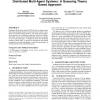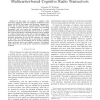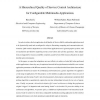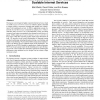227 search results - page 30 / 46 » Concurrency Tradeoffs in Dynamic Adaptation |
ATAL
2005
Springer
14 years 1 months ago
2005
Springer
Distributed Multi-Agent Systems (DMAS) such as supply chains functioning in highly dynamic environments need to achieve maximum overall utility during operation. The utility from ...
VTC
2006
IEEE
14 years 1 months ago
2006
IEEE
— In this paper, we evaluate a cognitive radio transceiver employing both non-contiguous multicarrier modulation (NC-MCM) and adaptive bit allocation. Although NCMCM and bit allo...
ERLANG
2004
ACM
14 years 1 months ago
2004
ACM
Structured Programming techniques are applied to a personal accounting software application implemented in erlang as a demonstration of the utility of processes as design construc...
JHSN
2000
13 years 7 months ago
2000
In order to achieve the best application-level Quality-of-Service (QoS), multimedia applications need to be dynamically tuned and reconfigured to adapt to fluctuating computing an...
SOSP
2001
ACM
14 years 4 months ago
2001
ACM
We propose a new design for highly concurrent Internet services, which we call the staged event-driven architecture (SEDA). SEDA is intended to support massive concurrency demands...




